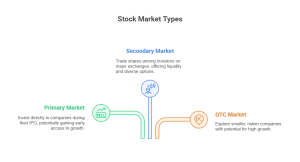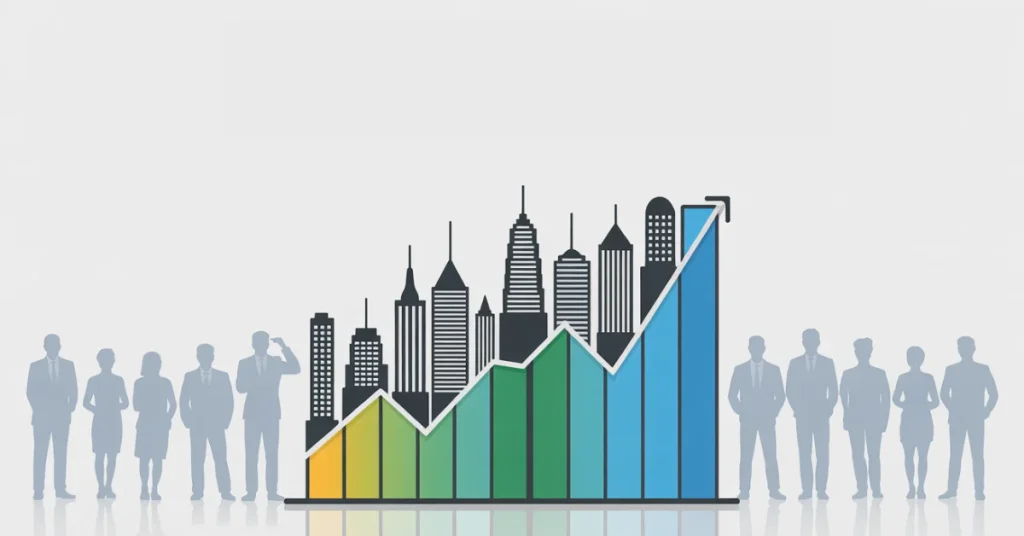On This Page
Table of Contents
The stock market is like the heartbeat of the financial world. It’s where investors buy and sell parts of publicly owned companies—what we call shares or stocks.
When you buy a stock, you’re buying a slice of ownership in a company. Whether it’s Apple, Amazon, or a small biotech startup—you’re stepping into the world of equity, capital, trading, and dividends.
So why does the stock market matter?
- It powers economies by helping companies raise money.
- It lets investors grow wealth by owning parts of successful businesses.
- It reflects the health of the economy, often acting as a leading indicator of what’s to come.
If you’re interested in stock market basics or figuring out how stock market works, you’re in the right place.
What Is the Stock Market?
At its core, the stock market is a network of exchanges and platforms where shares of companies are bought and sold.
Key Terms:
- Stock exchanges: Physical or digital marketplaces (like NYSE or NASDAQ).
- Public companies: Businesses that sell shares to the general public.
- Investors: People or institutions who buy stocks hoping for a return.
- Securities: A fancy term for stocks, bonds, ETFs, etc.
- Market participants: Anyone involved, from traders to brokers.
Real-World Example:
Apple (AAPL) trades on the NASDAQ. When you buy one share, you technically own a tiny piece of Apple. If Apple does well, your share might go up in value, or even pay you dividends in stocks, providing regular income.
The NYSE (New York Stock Exchange) and NASDAQ are two of the biggest exchanges globally. Then there’s the OTC (Over-the-Counter) market for smaller or riskier investments.
How Does the Stock Market Work?
Alright, so how does all this magic actually happen?
Think of the stock market like an auction—buyers and sellers negotiate prices for pieces of companies. The more demand, the higher the price. Less demand? Prices drop.
Here’s how it flows:
- You place an order through a broker (like Robinhood or Fidelity).
- The broker sends it to the market.
- A market maker or another investor matches your buy/sell order.
- The trade happens at the current price, influenced by supply and demand.
Important Lingo:
- Bid Price: What buyers are willing to pay.
- Ask Price: What sellers want for it.
- Market Order: Buy/sell at the current price.
- Limit Order: Buy/sell only at a specific price.
- Liquidity: How easily you can buy/sell something.
- Volatility: How wild the price movements are.
Most trades happen electronically in milliseconds. Investors also closely watch how stock prices move during acquisitions, earnings announcements, or major economic events. Many traders even explore broader financial learning, like Gold Trading Guide Strategies, to improve their understanding of market behavior and diversify their skill set.
Types of Stock Markets
There are two main types of stock markets:

Primary Market
This is where companies go public for the first time through an IPO (Initial Public Offering). Investors here are buying stock directly from the company.
- Examples: Facebook’s IPO in 2012, Airbnb’s IPO in 2020.
Secondary Market
Once shares are out there, they trade freely among investors in the secondary market—like on the NYSE or NASDAQ.
- You’re buying from other investors, not the company itself.
- Most stock market action happens here.
-
Investors often determine if a stock is undervalued before purchasing in this market.
OTC (Over-the-Counter)
Not every company qualifies for NYSE or NASDAQ listing. OTC markets deal with smaller, riskier companies.
Think of them as the indie bands of the stock world—not everyone’s cup of tea, but sometimes a breakout star emerges.
Participants in the Stock Market
Who’s making all this happen? Let’s break down the key players:
Retail Investors
That’s you and me. We buy and sell for personal goals—retirement, wealth building, or even fun.
Institutional Investors
Big money players: pension funds, insurance companies, hedge funds. Their moves can shift entire markets.
Traders
They don’t care much for long-term investments. Traders buy low and sell high sometimes in the same day. Many traders also use moving average to buy stocks as a technical strategy to identify trends and optimal entry points, helping them make more informed decisions.
Brokers
Middlemen (or women!) between you and the market. They execute trades and may offer research or tools.
- Full-service brokers: Offer advice, portfolio help, etc.
- Discount brokers: Lower fees, more DIY.
- Online platforms: Robinhood, E*TRADE, Schwab.
Regulators
In the U.S., that’s mostly the SEC (Securities and Exchange Commission) and FINRA. Their job? Keep the market fair and transparent.
Importance of the Stock Market
Why should you care about the stock market if you’re not a Wall Street shark?
Here’s why it matters:
- Capital Formation: Companies raise money to grow, hire, innovate.
- Wealth Building: Stocks have historically outperformed inflation.
- Economic Indicator: A rising market often signals a healthy economy.
- Transparency: Public companies must disclose financials regularly.
- Job Creation: Companies with access to capital expand faster.
Think About It:
When you invest in a company like Tesla or Microsoft, you’re fueling innovation and betting on progress. Pretty cool, right?
Wrapping It Up
By now, you should have a clearer picture of how the stock market works and why it’s such a powerful tool—for individuals and economies alike.
Let’s recap the essentials:
- The stock market is where shares are bought and sold.
- It’s driven by supply and demand and guided by regulators.
- Key players include retail investors, institutions, brokers, and regulators.
- It helps companies raise capital and allows individuals to grow wealth.
- Platforms like NYSE, NASDAQ, and OTC provide different ways to trade.
If you’re thinking of investing, start by:
- Setting your financial goals
- Learning about risk management
- Diversifying your portfolio
- Using educational tools like Vanguard, Investopedia, or NerdWallet
You don’t have to be a stock wizard to start investing—just be informed, patient, and consistent.
FAQs
What’s the best way to start investing in stocks?
Start small using beginner-friendly platforms like Robinhood or Fidelity. Consider index funds or ETFs before individual stocks.
Is the stock market risky?
Yes—but smart investing with long-term goals and diversified assets can help minimize risk.
How are stock prices determined?
By supply and demand. More buyers = higher prices. More sellers = lower prices.
Do I need a broker to invest?
Yes, but online brokers make this super easy and low-cost now.
What’s the difference between stocks and bonds?
Stocks = ownership. Bonds = lending money to a company/government for interest.
Read more about : Technical Analysis to Trade Gold Miner ETFs



